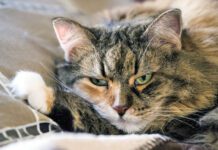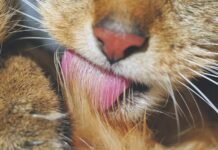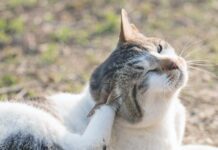Cats on the mend — or ones prone to acid reflux — fare better when they consume low-fat diets designed to strengthen their esophageal sphincters and moderate-level protein diets that seem to lessen the production of stomach acids. Meredith Miller, DVM, at Cornell also recommends:
– Feeding your cat small, frequent meals. This will help keep the stomach volume small and allow it to empty more easily.
– Discontinuing giving table scraps, especially fatty gristle, meat drippings and heavy cream. These trigger foods can spark an acid reflux episode.
– Serving your cat’s dinner early so he has time to digest the food before going to sleep. His esophageal sphincter relaxes then, which can worsen acid reflux episodes the next morning.
– Providing clean water served in clean bowls daily.
– Working with his veterinarian to select quality commercial diets best suited to acid relfux.



